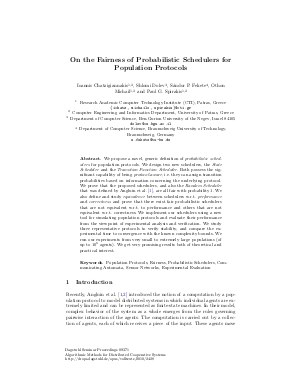On the Fairness of Probabilistic Schedulers for Population Protocols
Authors Ioannis Chatzigiannakis, Shlomi Dolev, Sándor Fekete, Othon Michail, Paul Spirakis
-
Part of:
Volume:
Dagstuhl Seminar Proceedings, Volume 9371
Part of: Series: Dagstuhl Seminar Proceedings (DagSemProc) - License:
 Creative Commons Attribution 4.0 International license
Creative Commons Attribution 4.0 International license
- Publication Date: 2010-04-22
File

PDF
DagSemProc.09371.4.pdf
- Filesize: 0.49 MB
- 23 pages
Document Identifiers
Subject Classification
Keywords
- Population Protocols
- Fairness
- Probabilistic Schedulers
- Communicating Automata
- Sensor Networks
- Experimental Evaluation
Metrics
- Access Statistics
-
Total Accesses (updated on a weekly basis)
0Document
0Metadata
Abstract
We propose a novel, generic definition of emph{probabilistic schedulers} for population protocols. We design two new schedulers, the emph{State Scheduler} and the emph{Transition Function Scheduler}. Both possess the significant capability of being emph{protocol-aware}, i.e. they can assign transition probabilities based on information concerning the underlying protocol. We prove that the proposed schedulers, and also the emph{Random Scheduler} that was defined by Angluin et al. cite{AADFP04}, are all fair with probability $1$. We also define and study emph{equivalence} between schedulers w.r.t. emph{performance} and emph{correctness} and prove that there exist fair probabilistic schedulers that are not equivalent w.r.t. to performance and others that are not equivalent w.r.t. correctness. We implement our schedulers using a new tool for simulating population protocols and evaluate their performance from the viewpoint of experimental analysis and verification. We study three representative protocols to verify stability, and compare the experimental time to convergence with the known complexity bounds. We run our experiments from very small to extremely large populations (of up to $10^{8}$ agents). We get very promising results both of theoretical and practical interest.
Cite As Get BibTex
Ioannis Chatzigiannakis, Shlomi Dolev, Sándor Fekete, Othon Michail, and Paul Spirakis. On the Fairness of Probabilistic Schedulers for Population Protocols. In Algorithmic Methods for Distributed Cooperative Systems. Dagstuhl Seminar Proceedings, Volume 9371, pp. 1-23, Schloss Dagstuhl – Leibniz-Zentrum für Informatik (2010)
https://doi.org/10.4230/DagSemProc.09371.4
BibTex
@InProceedings{chatzigiannakis_et_al:DagSemProc.09371.4,
author = {Chatzigiannakis, Ioannis and Dolev, Shlomi and Fekete, S\'{a}ndor and Michail, Othon and Spirakis, Paul},
title = {{On the Fairness of Probabilistic Schedulers for Population Protocols}},
booktitle = {Algorithmic Methods for Distributed Cooperative Systems},
pages = {1--23},
series = {Dagstuhl Seminar Proceedings (DagSemProc)},
ISSN = {1862-4405},
year = {2010},
volume = {9371},
editor = {S\'{a}ndor Fekete and Stefan Fischer and Martin Riedmiller and Suri Subhash},
publisher = {Schloss Dagstuhl -- Leibniz-Zentrum f{\"u}r Informatik},
address = {Dagstuhl, Germany},
URL = {https://drops.dagstuhl.de/entities/document/10.4230/DagSemProc.09371.4},
URN = {urn:nbn:de:0030-drops-24286},
doi = {10.4230/DagSemProc.09371.4},
annote = {Keywords: Population Protocols, Fairness, Probabilistic Schedulers, Communicating Automata, Sensor Networks, Experimental Evaluation}
}
